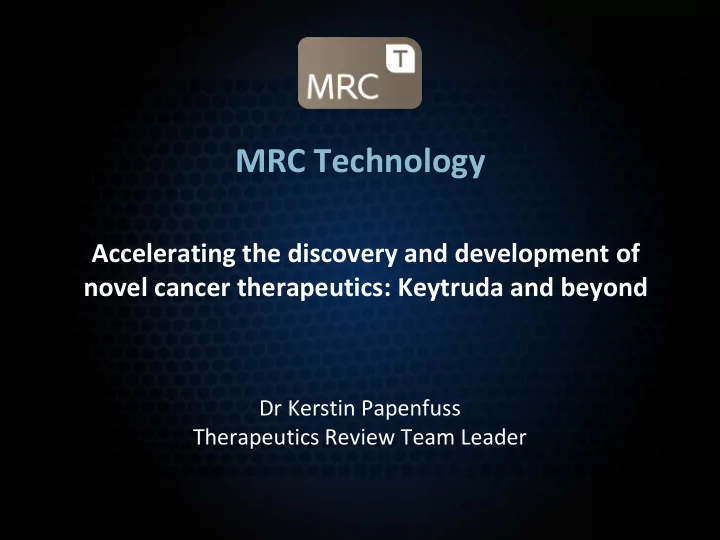

MRC Technology Accelerating the discovery and development of novel cancer therapeutics: Keytruda and beyond Dr Kerstin Papenfuss Therapeutics Review Team Leader
CHARITY status 140+ established 2000 staff MRC New PARTNERSHIPS heritage Forming partnerships ACADEMIC AND PHARMACEUTICAL to drive early stage NON PROFIT BIOTECHNOLOGY scientific research Institutions Markets to the patient Therapeutic ≈£20M antibodies Annual Rev 4 drugs on Small molecule the market drugs 10 drugs in development
Increased R&D costs De-Risking Targets Target Market Preclinical identification Clinical Trials Approval development & Validation Pharma downsizing Increased R&D costs
The Centre for Therapeutics Discovery Based at the Stevenage BioCatalyst Open Innovation Campus, UK A purpose built MRCT facility opened in April 2016 > 90 scientists State-of-the-art equipment and capabilities Chemistry and antibody engineering teams in one place offers unique flexibility
The Centre for Therapeutics Discovery HTS Screening Rational drug design Compound Libraries Medicinal Chemistry Lead Identification Lead Optimisation Assay development Hit generation Antibody Generation Assay Development Antibody Engineering ADME
Therapeutics on the market Humanising for over 25 years using MRC’s technology 56 antibodies humanised 4 currently on the market ATP in PknB Tamiflu in N1
Keytruda... One of the first IO drugs on the market Immuno-oncology (IO) è Paradigm shift in cancer treatment Immuno-oncology therapies are medicines that use the body’s q immune system to fight cancer They target the body’s immune system, not the tumour itself q They enable the immune system to selectively recognise and q attack cancer cells Keytruda (Prembrolizumab) è T-cell checkpoint inhibitor Binds to PD-1 and blocks PD-1 binding to its ligand q PD-1 is a T-Cell receptor that acts to ‘suppress’ T-Cell activity q when it binds PD-1 ligand (a natural ‘brake’ on the immune system) PD-1 ligand is expressed on the surface of many tumours q So tumours protect themselves against T-Cell attack by local q suppression of the immune system
Keytruda...how did we get involved? MRCT’s Antibody Humanisation Service 2014 2007 2008 2006 First FDA Deal signed è Project delivery of Presentation on approval humanised ab payment; clinical success antibody payments; royalty on humanisation to product sales Organon at BIO Organon were acquired by Schering-Plough Corporation in March 2007 (US$14.4b) Schering-Plough were acquired by MSD in November 2009 (US$41.1b) Interestingly the antibody doesn’t feature as a significant asset in either deal!
Keytruda…now Approved for: Stage IV melanoma, Metastatic NSCLC, Metastatic HNCC In clinical trials: 442 in total
…and beyond MRCT’s reaction to IO paradigm shift Opportunistic q Re-evaluate current cancer assets in IO context q Consider IO context for novel cancer projects Strategic: Immuno-Oncology Alliance with Cancer Research Technology q identify and validate novel drug discovery targets that could lead to new immunotherapy treatments
MRCT cancer portfolio Assay Development Hit Generation Hit to Lead Lead PAICS inhibitor CD36 Plexin B1 antibody ULK1 Cancer Osteoporosis and Metastatic cancer Cancer autophagy cancer Netherlands Cancer IRB Barcelona MRC Max Planck Institutes Institute ALK ADC MNK inhibitor Cancer Cancer Internal Southampton Uni MALT1 Cancer University of Lausanne Matriptase Confidential Osteoarthritis Cancer Newcastle MRC University
Opportunistic: MNK1 in IO Direct cancer target: MAP kinase-interacting serine/threonine kinase, which is activated by RAS and MAPK signaling pathways and is involved in regulation of protein translation. MNK1 is linked to cell transformation and tumorigenesis MRCT lead series: Selective, stable Target engagement ü in vitro ü in vivo Emerging data from competitor have identified MNK1 as Immuno- oncology target, showing T cell dependent anti-cancer effects in vivo and combination potential with PD-1 targeting drugs è we are now re-investigating our compounds in the context of similar IO models
Strategic: Alliances with Cancer Research Technology MRCT investment into CRT Discovery Labs brings together Cancer Research UK’s network of leading scientists with CRT’s cancer-focused validation expertise and our antibody screening and development capability New targets that increase cancer’s susceptibility to the immune system will be identified from Cancer Research UK’s funded research Aims to identify targets for the development of both antibody (MRCT) and small molecule therapeutics (CRT) Focus on early stage target validation carried out by CRT Validated targets will then enter into the respective company pipelines Still seeking a clinical partner to accelerate the progress of promising compounds into the clinic
THANK YOU! www.callfortargets.org Kerstin Papenfuss Therapeutics Review Team Leader, MRC Technology kerstin.papenfuss@tech.mrc.ac.uk - www.mrctechnology.org
Recommend
More recommend